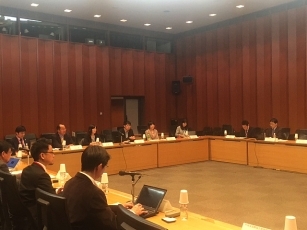Climate Change
Informal meeting among experts on climate change and regional affairs
follow-up on the report on climate change and fragility


Informal meeting among experts on climate change and regional affairs was held on March 28, 2018 at Ministry of Foreign Affairs (MOFA). Researchers of scientific field, experts of regional affairs, and officials from Ministry of Foreign Affairs and Ministry of Education, Culture, Sports, Science and Technology (MEXT) gathered to share the latest findings related to scientific researches on climate change and regional studies in order to discuss how policy makers and researchers should strengthen their collaboration in addressing the nexus between climate change and socioeconomic fragility.
1. Purpose of the meeting
There have been many studies on climate change and regional affairs conducted in each field, respectively; however, the number of factual analysis that includes the nexus between each field is not sufficient. The meeting was held as a follow-up meeting on the report “Analysis and Proposal of Foreign Policies Regarding the Impact of Climate Change on Fragility in the Asia-Pacific Region - With focus on natural disasters in the Region -” released from MOFA in September, 2017. Many feedbacks from the process of producing the report and sharing its outcomes showed a strong need of enhancing the collaboration between scientists studying climate change and experts of regional affairs. There were many suggestions that the scientists and experts should carry out their studies understanding the midterm and long-term challenges of climate change. The meeting was held in order to accelerate the interaction between the fields by inviting researchers and experts from some fields that were not mainly focused in the report as well as the collaborators of the report.
2. Issues pointed out in the meeting
After sharing the latest findings and future plans related to climate change in each institution, the participants of the meeting discussed what researchers, experts and governments should address to mull over measures against climate change and socioeconomic fragility in Asia-Pacific region. The following is some of the views expressed by experts at the meeting.
- (a) Research and study
- When conducting study on climate change impacts or implementing climate change measures in a region, it is important to understand and deliver the information needed by users such as climate change impact assessment institutions, local governments, aid organizations, and business operators.
- Regional characteristics need to be taken into consideration when forecasting climate change impacts; therefore, statistical assessments on uncertainty in climate change modeling are needed.
- Study on the socioeconomic impacts brought by climate change has not been conducted sufficiently. Studies on climate change and regional affairs need to incorporate perspectives from each field.
- (b) Climate change measures
- More effective implementation of climate change measures can be delivered by combining ecosystem-based measures and engineering measures.
- Implementation of climate change measures could sometimes produce negative impact on other environments. Impact assessments should be conducted not only on climate change impacts but also on impacts of the implementation of climate change measures.
- (c) Regional affairs
- Movement of people is caused not only by climate change but also by socioeconomic changes as well; therefore, it is necessary to consider regional affairs when addressing climate change measures on population movement.
- (d) While there have been much discussion on the need to conduct risk assessment on the impact of climate change on social economy and its fragility, a common view on an effective risk analysis seem not have emerged. Various points should be taken into consideration to produce effective risk assessment otherwise its outcome could be unbalanced or even prejudicial.
Takeaways and issues shared of the meeting will be discussed in an international meeting on climate change and fragility held by MOFA this year.
3. Institutions of the researchers, experts and officials
The Canon Institute for Global Studies, Conservation International Japan (CI Japan), Institute for Global Environmental Strategies (IGES), Japan International Cooperation Agency (JICA), Meteorological Research Institute (MRI), National Agriculture and Food Research Organization (NARO), National Research Institute for Earth Science and Disaster Resilience (NIED), National Institute for Environmental Studies (NIES), The Ocean Policy Research Institute (OPRI), Pacific Islands Centre (PIC), The University of Tokyo, and World Wide Fund for Nature Japan (WWF Japan), Ministry of Foreign Affairs, and Ministry of Education, Culture, Sports, Science and Technology


